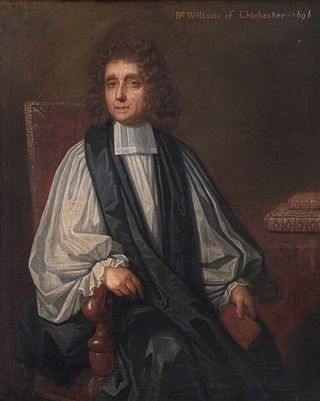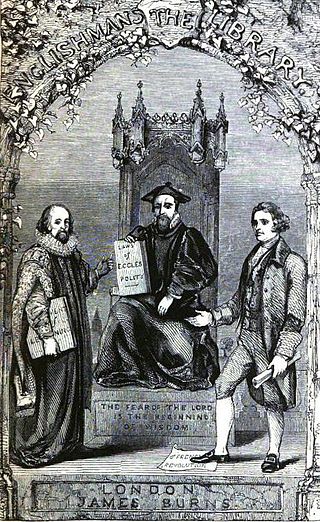Related Research Articles
Pierre Allix was a French Protestant pastor and author. In 1690 Allix was created Doctor of Divinity by Emmanuel College, Cambridge, and was given the treasurership and a canonry in Salisbury Cathedral by Bishop Gilbert Burnet. He discovered that Codex Ephraemi is a palimpsest.

The Bangorian Controversy was a theological argument within the Church of England in the early 18th century, with strong political overtones. The origins of the controversy lay in the 1716 posthumous publication of George Hickes's Constitution of the Catholic Church, and the Nature and Consequences of Schism. In it, Hickes, as Bishop of Thetford, on behalf of the minority non-juror faction that had broken away from the Church of England after the Glorious Revolution, excommunicated all but the non-juror churchmen. Benjamin Hoadly, the Bishop of Bangor, wrote a reply, Preservative against the Principles and Practices of Non-Jurors; his own Erastian position was sincerely proposed as the only test of truth.

The Roman Catechism or Catechism of the Council of Trent is a compendium of Catholic doctrine commissioned during the Counter-Reformation by the Council of Trent, to expound doctrine and to improve the theological understanding of the clergy. It was published in 1566.

Daniel Whitby (1638–1726) was a controversial English theologian and biblical commentator. An Arminian priest in the Church of England, Whitby was known as strongly anti-Calvinistic and later gave evidence of Unitarian tendencies.

Sir Charles Scarborough or Scarburgh MP FRS FRCP was an English physician and mathematician.
John Sergeant was an English Roman Catholic priest, controversialist and theologian.

William Bromley of Baginton, Warwickshire, was an English Tory politician who sat in the English and British House of Commons between 1690 and 1732. He was Speaker of the House of Commons of Great Britain from 1710 to 1713 and Secretary of State for the Northern Department from 1713 to 1714.

St Mildred, Poultry, was a parish church in the Cheap ward of the City of London dedicated to Anglo-Saxon Saint Mildred. It was rebuilt after the Great Fire of London, and demolished in 1872. St Mildred in the Poultry was the burial place of the writer Thomas Tusser. Some description of the church and its monuments is given in John Stow's Survey of London.
John Clement Gordon (1644–1726), originally just John Gordon, Bishop of Galloway, was born in Scotland on 1644 and was a member of the Gordon family of Coldwells, near Ellon in Buchan, Aberdeenshire.
John Fenn was an English Roman Catholic priest and writer, in exile under Elizabeth I of England. He was the elder brother of James Fenn, the Catholic martyr, and Robert Fenn.
Benjamin Bennet was an English Presbyterian minister.

John Williams was an English Bishop of Chichester.
The Tracts for the Times were a series of 90 theological publications, varying in length from a few pages to book-length, produced by members of the English Oxford Movement, an Anglo-Catholic revival group, from 1833 to 1841. There were about a dozen authors, including Oxford Movement leaders John Keble, John Henry Newman and Edward Bouverie Pusey, with Newman taking the initiative in the series, and making the largest contribution. With the wide distribution associated with the tract form, and a price in pennies, the Tracts succeeded in drawing attention to the views of the Oxford Movement on points of doctrine, but also to its overall approach, to the extent that Tractarian became a synonym for supporter of the movement.

The Chief Baron of the Irish Exchequer was the Baron (judge) who presided over the Irish Court of Exchequer. This was a mirror of the equivalent court in England, and was one of the four courts which sat in the building in Dublin which is still called The Four Courts.
The Socinian controversy in the Church of England was a theological argument on christology carried out by English theologians for around a decade from 1687. Positions that had remained largely dormant since the death in 1662 of John Biddle, an early Unitarian, were revived and discussed, in pamphlet literature.
Henry Foulis (1638–1669) was an English academic theologian and controversial author.
Thomas Gatacre was an English politician and cleric.

The Englishman's Library was an English book series of the 1840s, a venture of the publisher James Burns. It ran eventually to 31 volumes.
References
- ↑ "Bromley, John (BRMY671J)". A Cambridge Alumni Database. University of Cambridge.
- ↑ Starkie, Andrew. "Bromley, John". Oxford Dictionary of National Biography (online ed.). Oxford University Press. doi:10.1093/ref:odnb/3510.(Subscription or UK public library membership required.)
- 1 2 3 . Dictionary of National Biography . London: Smith, Elder & Co. 1885–1900.
- . Dictionary of National Biography . London: Smith, Elder & Co. 1885–1900.
- Attribution
![]() This article incorporates text from a publication now in the public domain : "Bromley, John". Dictionary of National Biography . London: Smith, Elder & Co. 1885–1900.
This article incorporates text from a publication now in the public domain : "Bromley, John". Dictionary of National Biography . London: Smith, Elder & Co. 1885–1900.